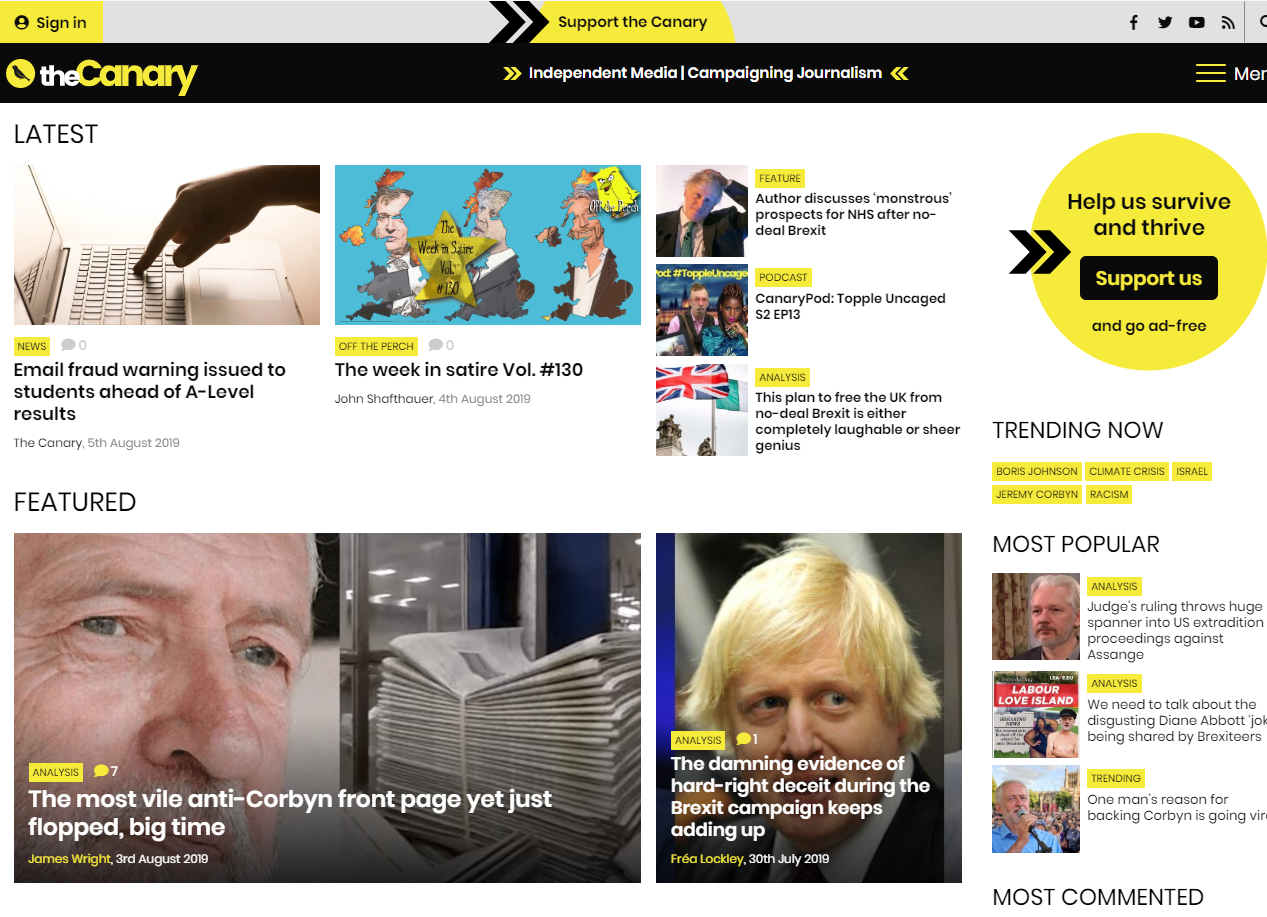
Left-leaning independent website The Canary will no longer rely on freelances and will instead employ a smaller number of newsroom staff after telling readers its business model “no longer works”.
The site, which was founded in 2015 and is openly supportive of Labour leader Jeremy Corbyn, blamed smears of anti-Semitism and pressure put on advertisers by “political Zionists” for its current difficulties.
It said it had also been affected by changes to Google and Facebook algorithms, the site revealed in an email to readers leaked by campaign group Stop Funding Fake News which opposes the Canary.
By the middle of this month it will “leave the gig economy”, editor Kerry-Anne Mendoza said on Twitter after the email was shared online.
Historically, all Canary writers were employed on freelance contracts.
Now, starting on Sunday, the website will instead become a “much leaner and more focused” newsroom made up of seven staff writers and editors.
A year after its launch, Mendoza told Press Gazette The Canary had a 25-strong editorial team working part-time, among whom revenue from advertising and sponsored content was divided after costs.
In the email to readers, the Canary said the “tough” changes were necessary after taking a “long, hard look at how we work” and that the new set-up would “offer our writers and editors greater security”.
The site’s existing freelance writers who did not get salaried positions will still be able to pitch stories but these will be limited to “only a few articles each day, at least initially”.
The email, sent to readers on 26 July and again three days later but only leaked on Friday, said: “Our model – relying on social media to drive traffic which generates advertising revenue – no longer works.
“Facebook and Google changed their algorithms, meaning fewer people now see our articles. And people who don’t like our politics have encouraged our advertisers to blacklist us.
“That’s come at a cost. Despite clearly being against the actions of the state, not against Jewish people as an ethnic group, we’ve been smeared with accusations of anti-Semitism by those who’ve weaponised the term for political ends.
“In the current post-truth political landscape, accusations stick – despite facts to the contrary. That means advertisers are susceptible to pressure from political Zionists, and our advertising revenue is under fire.”
After the email was leaked, Canary editor-in-chief Kerry-Anne Mendoza confirmed the news on Twitter, saying: “This is what censorship looks like under capitalism.”
A Canary spokesperson told Press Gazette the new business model will be temporary while more permanent changes are planned.
The website also announced it has introduced a target of signing up 1,000 new financial supporters by the end of the year “to survive”.
Supporters will be able to view the website without adverts and receive a monthly behind the scenes newsletter.
Mendoza said anyone who donates will have “personally thwarted attempts to shut us down”, adding: “You will have saved a news organisation from being censored out of existence”.
A Canary spokesperson told Press Gazette: “It has always been our intention to move to a mainly reader-funded model and we are delighted that we have now built a base of loyal supporters who are willing to contribute financially.
“The Canary remains free at the point of service and members benefit from an advertising-free experience on the site.
“We’ve changed a lot since day one. We’ve recruited and trained an excellent team of editors, and expanded our investigative journalism. This has increased what it costs to run The Canary.
“So, rather than continue running at a deficit, which would mean we’d have to close our doors in early 2020, we have asked our readers to help close the gap.
“We have also looked for every possible way to maintain the quality and quantity of output. So, we will be moving, temporarily, to a new business model.”
A spokesperson for the Stop Funding Fake News group told Press Gazette they were “delighted to play a part in forcing them to downsize and making them loss-making”.
“It’s good news for our democracy that the clickbait business model of ad-funded misinformation no longer works.”
The Canary is regulated by Impress and was the most complained about member of the regulator in 2017/18, according to the body’s latest annual report.
Two complaints were upheld against it in that time, which Canary managing director Drew Rose said “should be viewed in context of the number of articles we publish – over 9,000 since our launch in 2015”.
According to Canary Media’s latest balance sheet on Companies House for the year to 30 September 2018, the company had £41,080 in cash, down slightly from £49,575 in 2017.
The amount owed to creditors within one year was £8,212 in 2018, compared to £23,993 the year before.
Mendoza told Press Gazette in 2016 the website had achieved a turnover of £250,000 in its first year.
Email pged@pressgazette.co.uk to point out mistakes, provide story tips or send in a letter for publication on our "Letters Page" blog
